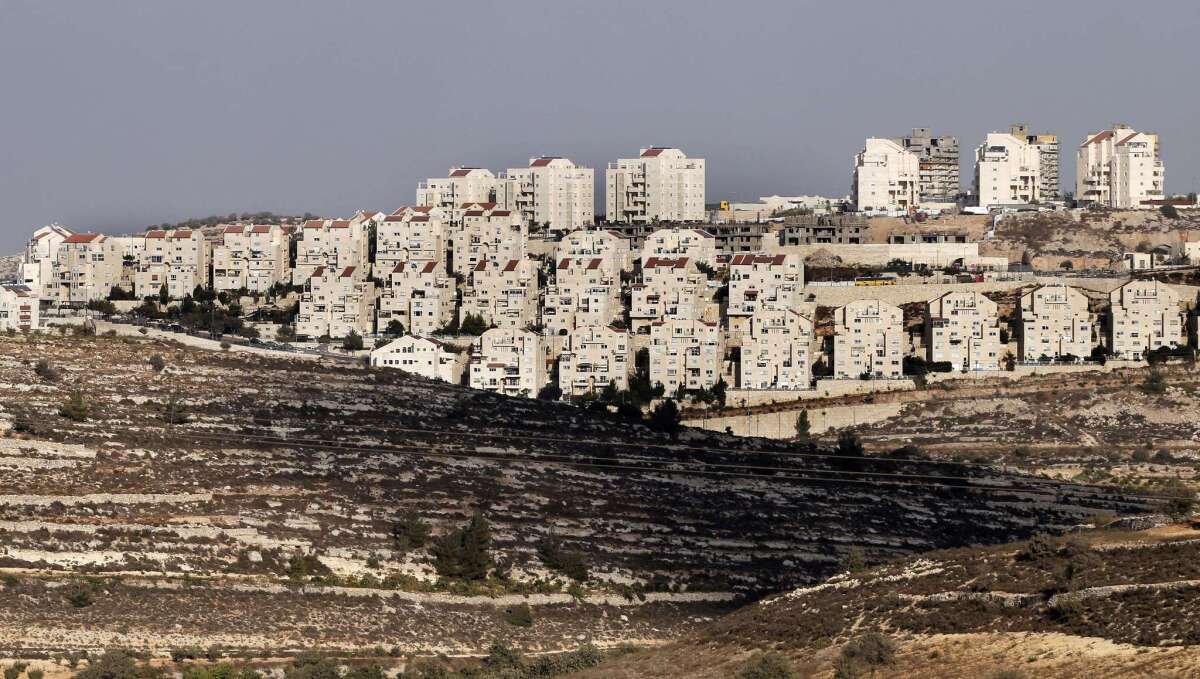Jewish settlers in West Bank find legitimacy in Trump peace plan

- Share via
EFRAT, West Bank — On these contested hills where rosemary and thistle grow, Tatzi Cahn does not expect President Trump’s recent Middle East peace proposal to significantly change her life on land she and other Jewish settlers regard as a Biblical birthright.
Unlike Trump and Israeli Prime Minister Benjamin Netanyahu, who view the plan they unveiled last week as a windfall for Israel’s West Bank settlements, which are considered illegal under international law, she does not believe it will significantly affect her life. But it does offer her legitimacy.
“The best thing was Trump declaring that basically, he recognizes the history of the rights of the Jewish people over the land of Israel,” said Cahn, a mother of nine. “Yes, we have a strong army,” she added, glancing toward the rocky landscape, “but when you think about it, it is a miracle that we are here … the few against the many.”
The political extension of Trump’s recognition, giving Israel permission to annex the West Bank or parts of it, has outraged Palestinians, who make up nearly 87% of the territory’s population of 3 million. Although the plan — presented as “a vision to improve the lives of the Palestinian and Israeli people” — foresees a four year-settlement freeze on a few isolated communities, it is widely regarded as Trump’s stamp of approval for Israeli expansionism. That prospect, according to Palestinian leaders, the Arab League and the European Union, destroys any hope of a two-state solution.
The views of Cahn, 43, reflected the sentiment of many settlers who fear that international attention focusing on the plight of West Bank Palestinians, who have lived under Israeli military rule for 52 years, will result in Jews being pushed from their homes. The Trump plan calls for no Israeli or Palestinian to be uprooted.
Although Cahn said crucial details, such as possible settlement evacuations and the Palestinian right to self-determination, “remain too complex,” the American president’s recognition of Jewish links to this ancient land are a vindication.

Behind her at the supermarket, Mahmoud Salah, 36, a Palestinian from neighboring Bethlehem, was inspecting the work of his employees. The store is a rare point of interface between West Bank Palestinians and Israelis, who live largely separate existences.
Salah, 36, the father of two young girls, has worked at the Rami Levy market for nine years. He manages the in-house brand. Like Cahn, he didn’t expect Trump’s plan to noticeably affect his life, though he found little to applaud in it.
“I don’t think it’ll achieve anything, or really help anyone,” he said, mentioning Trump’s declaration that Jerusalem will remain Israel’s “undivided capital” as a nonstarter, given that Palestinians claim East Jerusalem as the capital of their future state.
“From the time I was a boy I’ve been hearing, ‘Jerusalem, Jerusalem, Jerusalem is for Palestinians,’” he said. “It is all I ever heard. People older than me will tell you the same thing.”
Efrat was co-founded in 1983 by Shlomo Riskin, the former rabbi of New York’s Lincoln Square Synagogue. The community retains the ambiance of an American suburb. But according to Sara Yael Hirschhorn, a visiting assistant professor of Israel studies at Northwestern University, its easygoing aesthetic “belies what is going on there politically.”
Hirschhorn, author of “City on a Hilltop: American Jews and the Israeli Settler Movement,” said that Efrat’s progressive attitudes toward religious observance should not be mistaken for progressive views regarding the local conflict. She said residents of Efrat are “often very extreme.”
In the 2019 elections, the New Right party of Defense Minister Naftali Bennett received the largest amount of Efrat votes. Bennett has congratulated Trump on the new plan but withheld his support because it aims at the establishment of a Palestinian state alongside Israel, which Bennett opposes.
On Tuesday, a group of settlement leaders pitched a protest tent across from Netanyahu’s Jerusalem office, demanding that he impose Israeli sovereignty over the West Bank even before next election on March 2. Last week, Netanyahu promised to bring the question of Israeli law in the occupied territories to a Cabinet vote on Sunday, but backed down when the White House balked at the prospect of unilaterally imposed measures.
Settlement leader Yossi Dagan urged Netanyahu to act even without American approval and warned that the prime minister was “missing an historic opportunity that will be a cry for generations. Sovereignty is a cornerstone of the state of Israel.”
Quoting Sylvester Stallone in “Rambo 2,” Dagan said, “What do I want? I want the country to love me the way I love it. Mr. Prime Minister … love us the way we love you. We’re tired of being the right-wing government’s ugly duckling.”
Palestinians see the West Bank as the fertile heart of a longed-for state, and home to Ramallah, the Palestinian Authority’s de facto capital. Many of the Israelis who moved to, and built up, the West Bank since Israel captured it from Jordan during the 1967 Middle East War, view this land as the promised land in which the patriarchs Abraham and Isaac are buried.
Most international organizations consider the West Bank’s 400,000 Jewish settlers an obstacle to the two-state solution advanced by the international community — and by Netanyahu’s principal electoral challenger, the centrist former army chief Benny Gantz.
Oded Revivi was not among the settlement leaders protesting outside Netanyahu’s office. The 51-year-old mayor of Efrat, a town of about 10,000, is a member of the prime minister’s conservative Likud Party. Revivi was invited to join Netanyahu in Washington for the presentation of the Peace to Prosperity plan, as White House has formally named it.
“It is not a peace plan,” he says. “It isn’t even a draft. It’s a vision of how the administration thinks we should go forward.”
Despite the opposition of other West Bank leaders, he supports Trump’s proposal, because as he sees it, between the looming Israeli ballot and the U.S. elections in November, there is only a small window of opportunity to bring a needed protection to his constituents.
He believes Trump’s widely criticized map of a largely Israeli West Bank splotched with noncontiguous Palestinian enclaves “for the first time comes closer to describing reality than all the drafts we’ve had before.”
“This is the reality,” he said. “Let’s make it into a legal concept.” For example, he hopes the imposition of Israeli law — which it appears Netanyahu cannot lawfully enact before the election — will allow Efrat residents to build without requiring approval from the military administration.
“He’s waiting to hear what [the Americans] say,” Revivi says, explaining Netanyahu’s flip-flop on annexation. “We’ll see what they say.”
More to Read
Sign up for Essential California
The most important California stories and recommendations in your inbox every morning.
You may occasionally receive promotional content from the Los Angeles Times.













